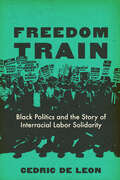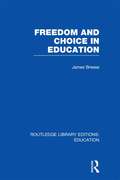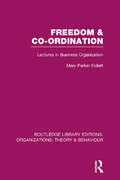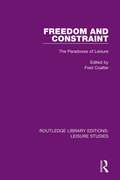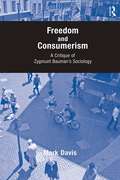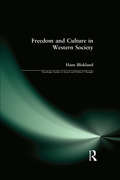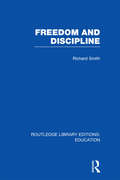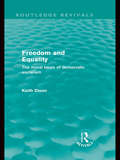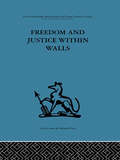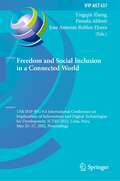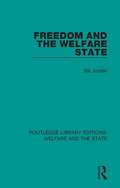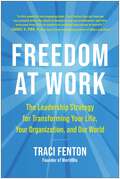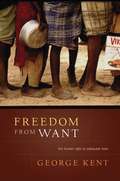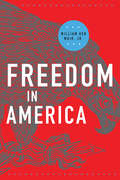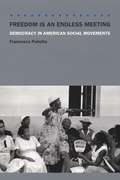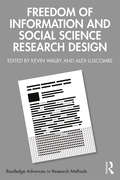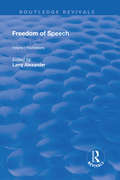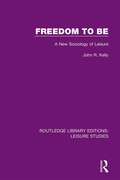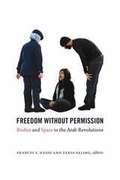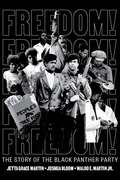- Table View
- List View
Freedom Train: Black Politics and the Story of Interracial Labor Solidarity
by Cedric De LeonRevealing the central role of Black activists in spurring interracial solidarity in the US labor movement. Most accounts of interracial solidarity focus on white union activists. In Freedom Train, Cedric de Leon, a former organizer and elected leader in the US labor movement, argues that we can't comprehend the history of workers' triumphs in the United States without investigating the role of Black liberation. This book shows that, from the early twentieth century to the years immediately following the March on Washington and beyond, independent Black labor organizations have pushed the white labor movement toward a fierce and effective interracial solidarity. Drawing on the minutes, correspondence, and speeches of Black labor activists and organizations from 1917 to 1968, de Leon reveals that Black people have been the most ardent and consistent proponents of racial inclusion, leadership representation, and programs linking economic and racial justice. He also demonstrates how conflict and consensus among Black labor groups fueled the fight for solidarity, as different factions split and consolidated to form successive and sometimes competing Black labor organizations. Freedom Train centers the contributions of Black people to the multiracial unions we have today and demonstrates that internal conflict can be a source of strategic innovation and social movement success.
Freedom and Choice in Education (Routledge Library Editions: Education)
by James BreeseMuch of the material included here owes it inspiration to discussions held with groups of student teachers in the early 1970s. The book is written for such students and discusses issues such as the acquisition of knowledge, the value of examinations, dependency and religion in education. The book is intended as a thought provoker – to stimulate further discussion.
Freedom and Co-ordination: Lectures in Business Organization (Routledge Library Editions: Organizations)
by Mary Parker FollettA pioneer in the fields of organizational theory and behaviour Mary Parker Follett authored a number of books and numerous essays, articles and speeches on human relations, political philosophy, psychology and management. The first woman invited to address the London School of Economics, this book includes five lectures delivered to the newly-formed Department of Business Administration at the LSE in 1933, as well as six given by Parker Follett a the Taylor Society in New York in 1926.
Freedom and Constraint: The Paradoxes of Leisure (Routledge Library Editions: Leisure Studies)
by Fred CoalterFirst published in 1989. In the climate of long-term unemployment, early retirement, and technology that is seen to threaten jobs, 'leisure’ has been presented as the solution to a multitude of social problems. The essays in this collection represent the most important arguments on the problems, myths, and misunderstandings of leisure. Arguing from a range of positions, some sceptical, others more idealistic, they look at the complexities of this field and the social and political problems that surround it. No single argument dominates. What emerges is a live-wire debate on class and gender, employment and economic status, age and education, which brings the discussion of leisure controversially up to date. The book, based on papers presented to conferences of the Leisure Studies Association, divides into sections on leisure and social change, the relationship between leisure and social structures, and the tension between leisure and employment. It takes a critical look at leisure in Britain, Sweden, the Netherlands, and the USA, and at the paradoxes that will determine its future. Whilst refusing to see leisure as a synonym for social progress and liberalization, it argues that the quality of leisure reflects the quality of society itself.
Freedom and Consumerism: A Critique of Zygmunt Bauman's Sociology
by Mark DavisHow does Bauman understand the concept of freedom, and how does this understanding relate to the political traditions of conservatism, liberalism and socialism? Mark Davis offers a critical enquiry into the sociology of Zygmunt Bauman, focusing on his English-language writings from the 1960s onwards. The book contributes to sociological debates about modern society by offering an interpretation of Bauman's work based on the concept of freedom, especially in terms of his extensive consideration of consumerism. Existing studies of Bauman have tended to focus uncritically upon other salient themes in his work, notably culture, power and socialism; Davis repairs the lack of critical engagement in the literature by identifying freedom as a focus for critical reflection. He also opens up new areas of discourse by analyzing Bauman's understanding of freedom in relation to the three great political traditions of conservatism, liberalism and socialism. This is an original contribution to discussions around Bauman's work which will be of interest to both sociologists and political theorists.
Freedom and Culture in Western Society (Routledge Studies in Social and Political Thought #5)
by Hans BloklandCritically examining conceptions of freedom of some of the leading contemporary philosophers from Isaiah Berlin to Charles Taylor, Hans Blokland explores the value and significance that freedom has acquired on our political consciousness. He looks specifically at: * positive and negative freedom * freedom of the individual * freedom and society * emancipation and paternalism * freedom and cultural politics.
Freedom and Discipline (Routledge Library Editions: Education)
by Richard SmithQuestions of discipline and order arise wherever formal education is practised, and are particularly acute for those training to teach or in their first school posts. For many years now writing on these topics has tended to depict teaching as the deployment of ‘skills’ and ‘techniques’ and competent teachers as those who successfully ‘manage’ their classes. This approach is criticised by Richard Smith as manipulative and destructive of the kind of pupil-teacher relationship conducive to any but the most trivial sorts of learning. Thus the philosophical issues which the book explores are shown throughout to have their roots in problems associated with established thinking and practice, and the author’s ideas have considerable practical relevance. He argues for a thorough reappraisal of the nature and basis of the teacher’s authority and demonstrates the importance of a proper understanding of the function of punishment. He suggests that many of the problems of discipline that teachers meet may actually stem from inappropriate ways of treating pupils, and shows that solutions to these problems must be compatible with the degree of initiative and personal responsibility that it is the business of education to foster. Schools have changed in many ways, largely for the better, since the first edition of this book appeared: the young people in them are generally treated with far more respect than was the case a quarter of a century ago. The voices of a more repressive tradition however still make themselves heard from time to time. It is therefore important continually to re-state the principles on which civilised relationships between pupils and teachers need to be based.
Freedom and Equality: The Moral Basis of Democratic Socialism (Routledge Revivals)
by Keith DixonUnashamedly polemical, this reissue of Freedom & Equality, first published in 1986, presents a strong and persuasively argued case for democratic socialism. In contrast to many recent books justifying conservatism and varieties of Marxism, Keith Dixon defends the two great principles underpinning democratic socialism – freedom and equality. He aims both to restore the idea of freedom to its proper place in the political vocabulary of the left and to defend a stark version of freedom as absence of constraint. Only this version of freedom, he argues, is consistent with the proper defence of civil liberties. Dixon also defends radical egalitarianism from its critics, who either repudiate its full force or reject it out of hand. He believes that freedom and equality are potentially realizable socialist goals, that democratic socialism is not necessarily linked with fraternalism, and – above all – that it should be based upon a firm and consistent conception of individuality.
Freedom and Justice within Walls: The Bristol Prison experiment (International Behavioural And Social Sciences Ser. #Vol. 18)
by F E EmeryTavistock Press was established as a co-operative venture between the Tavistock Institute and Routledge & Kegan Paul (RKP) in the 1950s to produce a series of major contributions across the social sciences. This volume is part of a 2001 reissue of a selection of those important works which have since gone out of print, or are difficult to locate. Published by Routledge, 112 volumes in total are being brought together under the name The International Behavioural and Social Sciences Library: Classics from the Tavistock Press. Reproduced here in facsimile, this volume was originally published in 1970 and is available individually. The collection is also available in a number of themed mini-sets of between 5 and 13 volumes, or as a complete collection.
Freedom and Social Inclusion in a Connected World: 17th IFIP WG 9.4 International Conference on Implications of Information and Digital Technologies for Development, ICT4D 2022, Lima, Peru, May 25–27, 2022, Proceedings (IFIP Advances in Information and Communication Technology #657)
by Pamela Abbott Yingqin Zheng Jose Antonio Robles-FloresThis book constitutes the refereed proceedings of the 17th IFIP WG 9.4 International Conference on Social Implications of Computers in Developing Countries, ICT4D 2022, which was supposed to be held in Lima, Peru, in May 2021, but was held virtually instead due to the COVID-19 pandemic.The 40 revised full papers presented were carefully reviewed and selected from 58 submissions. The papers present a wide range of perspectives and disciplines including (but not limited to) public administration, entrepreneurship, business administration, information technology for development, information management systems, organization studies, philosophy, and management. They are organized in the following topical sections: digital platforms and gig economy; education and health; inclusion and participation; and business innovation and data privacy.
Freedom and the Construction of Europe: Volume 1, Religious Freedom and Civil Liberty
by Quentin Skinner Martin Van GelderenFreedom, today perceived simply as a human right, was a continually contested idea in the early modern period. In Freedom and the Construction of Europe an international group of scholars explore the richness, diversity and complexity of thinking about freedom in the shaping of modernity. Volume 1 examines debates about religious and constitutional liberties, as well as exploring the tensions between free will and divine omnipotence across a continent of proliferating religious denominations. Volume 2 considers free persons and free states, examining differing views about freedom of thought and action and their relations to conceptions of citizenship. Debates about freedom have been fundamental to the construction of modern Europe, but represent a part of our intellectual heritage that is rarely examined in depth. These volumes provide materials for thinking in fresh ways not merely about the concept of freedom, but how it has come to be understood in our own time.
Freedom and the Construction of Europe: Volume 2, Free Persons and Free States
by Quentin Skinner Martin Van GelderenFreedom, today perceived simply as a human right, was a continually contested idea in the early modern period. In Freedom and the Construction of Europe an international group of scholars explore the richness, diversity and complexity of thinking about freedom in the shaping of modernity. Volume 1 examines debates about religious and constitutional liberties, as well as exploring the tensions between free will and divine omnipotence across a continent of proliferating religious denominations. Volume 2 considers free persons and free states, examining differing views about freedom of thought and action and their relations to conceptions of citizenship. Debates about freedom have been fundamental to the construction of modern Europe, but represent a part of our intellectual heritage that is rarely examined in depth. These volumes provide materials for thinking in fresh ways not merely about the concept of freedom, but how it has come to be understood in our own time.
Freedom and the Welfare State (Routledge Library Editions: Welfare and the State #10)
by Bill JordanOriginally published in 1976, Freedom and the Welfare State, critiques the Welfare State in Britain and analyses the relationship between freedom and welfare. The book considers philosophical, literary and political expressions of the ideals of liberty, and relates them to present-day issues in social policy and the social services. It tackles the major questions emerging in the current welfare debate such as, does state assistance destroy individual initiative and independence and, are welfare institutions agencies of social control which reinforce the dominant economic order?
Freedom at Midnight
by Larry Collins Dominique LapierreFirst published in 1975, this 2009 edition is a new edition of the best-selling book described as irreplaceable by Le Monde, Paris. It is a poignant reminder of the defining moments of the end of the British Raj, the independence of 400 million people, their division into India and the newly created Pakistan.
Freedom at Work: The Leadership Strategy for Transforming Your Life, Your Organization, and Our W orld
by Traci FentonDiscover the leadership strategy for unlocking your team&’s greatness. Whether it shows up as stress, top-down leadership styles, drama, or uncertainty, fear kills good decision-making, dampens morale, lowers employee engagement, and hurts bottom-line growth. The good news is that there&’s an antidote: Freedom at Work. In this groundbreaking book, Traci Fenton brings together decades of original research, based on her team&’s work with hundreds of top companies around the world, such as The WD-40 Company, Mindvalley, DaVita, Menlo Innovations, Zappos, HCL Technologies, and more, revealing the proven pathway to leadership success. This powerful strategy will benefit any leader at any level in any type of organization, from entrepreneurs to mid-level managers to the C-suite. Freedom at Work is based on three key pillars: Freedom-Centered Mindset: Break through limitations, make better decisions, and act with clarity and confidence Freedom-Centered Leadership: Lead yourself and others from a place of freedom rather than fear Freedom-Centered Design: Develop a world-class culture based on the 10 Principles of Organizational Democracy Freedom at Work is a revolutionary guide that will help make any organization high-performing and highly profitable, while creating a culture people love. This book will help passionate leaders weave freedom and democracy into our global tapestry through the way they run their teams and organizations—ultimately transforming our world for the better.
Freedom from Want: The Human Right to Adequate Food (Advancing Human Rights)
by George KentThere is, literally, a world of difference between the statements "Everyone should have adequate food," and "Everyone has the right to adequate food." In George Kent's view, the lofty rhetoric of the first statement will not be fulfilled until we take the second statement seriously. Kent sees hunger as a deeply political problem. Too many people do not have adequate control over local resources and cannot create the circumstances that would allow them to do meaningful, productive work and provide for themselves. The human right to an adequate livelihood, including the human right to adequate food, needs to be implemented worldwide in a systematic way. Freedom from Want makes it clear that feeding people will not solve the problem of hunger, for feeding programs can only be a short-term treatment of a symptom, not a cure. The real solution lies in empowering the poor. Governments, in particular, must ensure that their people face enabling conditions that allow citizens to provide for themselves.
Freedom in America
by William Ker MuirIf you want students to really understand the concept of power, moving beyond a survey book's quick discussion of Laswell's "who gets what and how," Muir's thoughtful Freedom in America might be the book for you. Exploring the words and ideas of such thinkers as Madison, Jefferson, Hamilton, and Tocqueville, Muir discusses the nature and limits of three types of power—coercive, reciprocal, and moral—and then uses this framework to explain how American political institutions work. If looking for an alternative to a long survey text—or itching to get students grappling with The Federalist Papers or Democracy in America with more of a payoff—Muir's meditation on power and personal freedom is a gateway for students to take their study of politics to the next level. His inductive style, engaging students with well-chosen and masterfully written stories, lets him draw out and distill key lessons without being preachy. Read a chapter and decide if this page turner is for you.
Freedom is Not Enough
by William S. ClaysonLed by the Office of Economic Opportunity, Lyndon Johnson's War on Poverty reflected the president's belief that, just as the civil rights movement and federal law tore down legalized segregation, progressive government and grassroots activism could eradicate poverty in the United States. Yet few have attempted to evaluate the relationship between the OEO and the freedom struggles of the 1960s. Focusing on the unique situation presented by Texas, Freedom Is Not Enough examines how the War on Poverty manifested itself in a state marked by racial division and diversity - and by endemic poverty. Though the War on Poverty did not eradicate destitution in the United States, the history of the effort provides a unique window to examine the politics of race and social justice in the 1960s. William S. Clayson traces the rise and fall of post-war liberalism in the Lone Star State against a backdrop of dissent among Chicano militants and black nationalists who rejected Johnson's brand of liberalism. The conservative backlash that followed is another result of the dramatic political shifts revealed in the history of the OEO, completing this study of a unique facet in Texas's historical identity.
Freedom is Power
by Lawrence HamiltonUsing the history of political thought and real-world political contexts, including South Africa and the recent global financial crisis, this book argues that power is integral to freedom. It demonstrates how freedom depends upon power, and contends that liberty for all citizens is best maintained if conceived as power through political representation. Against those who de-politicise freedom through a romantic conception of 'the people' and faith in supposedly independent judicial and political institutions, Lawrence Hamilton argues that real modern freedom can only be achieved through representative and participative mechanisms that limit domination and empower classes and groups who become disempowered in the conflicts that inevitably pervade politics. This is a sophisticated contribution to contemporary political theory that will be of interest to scholars and students of history, politics, philosophy, economics, sociology, development studies and Southern African studies.
Freedom is an Endless Meeting: Democracy in American Social Movements
by Francesca PollettaFreedom Is an Endless Meeting offers vivid portraits of American experiments in participatory democracy throughout the twentieth century. Drawing on meticulous research and more than one hundred interviews with activists, Francesca Polletta challenges the conventional wisdom that participatory democracy is worthy in purpose but unworkable in practice. Instead, she shows that social movements have often used bottom-up decision making as a powerful tool for political change. Polletta traces the history of democracy in early labor struggles and pre-World War II pacifism, in the civil rights, new left, and women's liberation movements of the sixties and seventies, and in today's faith-based organizing and anti-corporate globalization campaigns. In the process, she uncovers neglected sources of democratic inspiration—Depression-era labor educators and Mississippi voting registration workers, among them—as well as practical strategies of social protest. But Freedom Is an Endless Meeting also highlights the obstacles that arise when activists model their democracies after familiar nonpolitical relationships such as friendship, tutelage, and religious fellowship. Doing so has brought into their deliberations the trust, respect, and caring typical of those relationships. But it has also fostered values that run counter to democracy, such as exclusivity and an aversion to rules, and these have been the fault lines around which participatory democracies have often splintered. Indeed, Polletta attributes the fragility of the form less to its basic inefficiency or inequity than to the gaps between activists' democratic commitments and the cultural models on which they have depended to enact those commitments. The challenge, she concludes, is to forge new kinds of democratic relationships, ones that balance trust with accountability, respect with openness to disagreement, and caring with inclusiveness. For anyone concerned about the prospects for democracy in America, Freedom Is an Endless Meeting will offer abundant historical, theoretical, and practical insights. "This is an excellent study of activist politics in the United States over the past century. . . . Assiduously researched, impressively informed by a great number of thoughtful interviews with key members of American social movements, and deeply engaged with its subject matter, the book is likely to become a key text in the study of grass-roots democracy in America. "—Kate Fullbrook, Times Literary Supplement "Polletta's portrayal challenges the common assumption that morality and strategy are incompatible, that those who aim at winning must compromise principle while those who insist on morality are destined to be ineffective. . . . Rather than dwell on trying to explain the decline of 60s movements, Polletta shows how participatory democracy has become the guiding framework for many of today's activists. "—Richard Flacks, Los Angeles Times Book Review "In Freedom Is an Endless Meeting, Francesca Polletta has produced a remarkable work of historical sociology. . . . She provides the fullest theoretical work of historical sociology. . . . She provides the fullest theoretical picture of participatory democracy, rich with nuance, ambiguity, and irony, that this reviewer has yet seen. . . . This wise book should be studied closely by both academics and by social change activists. "—Stewart Burns, Journal of American History
Freedom of Information and Social Science Research Design (Routledge Advances in Research Methods)
by Kevin Walby Alex LuscombeThis multidisciplinary volume demonstrates how Freedom of Information (FOI) law and processes can contribute to social science research design across sociology, criminology, political science, anthropology, journalism and education. Comparing the use of FOI in research design across the United Kingdom, the United States, Australia, Canada and South Africa, it provides readers with resources to carry out FOI requests and considers the influence such requests can have on debates within multiple disciplines. In addition to exploring how scholars can use FOI disclosures in conjunction with interview data, archival data and other datasets, this collection explains how researchers can systematically analyse FOI disclosures. Considering the challenges and dilemmas in using FOI processes in research, it examines the reasons why many scholars continue to rely on more easily accessible data, when much of the real work of governance, the more clandestine but consequential decisions and policy moves made by government officials, can only be accessed using FOI requests.
Freedom of Speech (Routledge Revivals)
by Larry AlexanderThis title was first published in 2000. This text presents a two-volume collection of theoretical articles on the topic of freedom of speech. The articles have all been written since the early 1970s. The first volume begins with an encyclopaedia entry, functioning as an overview of the topic, and further articles deal with justificatory theories of freedom of speech, the scope of the First Amendment, the value of free speech, communication control in law and society, and what kinds of acts raise freedom of speech concerns. The second volume turns to doctrinal theories, examining insults, incitements and governmental subsidies. Areas addressed include distinctions between content regulations, Robert Post's concepts of the public forum and public discourse and their bearing on free speech doctrine, and the significant arena for free speech controversies in the future.
Freedom to Be: A New Sociology of Leisure (Routledge Library Editions: Leisure Studies #6)
by John R. KellyFirst published in 1987. Following an introductory chapter on the nature of theory and the outline of the book, there are eight chapters on the explanatory approaches, or models, employed in this dialectical analysis of the leisure industry. These models focus on particular elements of leisure: experience, decision, development, identities, interaction, institutions, political forces, and human definitions. With a new preface to the re-issue by the author, this title will be of great interest to students of Sociology and Leisure Studies.
Freedom without Permission: Bodies and Space in the Arab Revolutions
by Zakia Salime Frances S. HassoAs the 2011 uprisings in North Africa reverberated across the Middle East, a diverse cross section of women and girls publicly disputed gender and sexual norms in novel, unauthorized, and often shocking ways. In a series of case studies ranging from Tunisia's 14 January Revolution to the Taksim Gezi Park protests in Istanbul, the contributors to Freedom without Permission reveal the centrality of the intersections between body, gender, sexuality, and space to these groundbreaking events. Essays include discussions of the blogs written by young women in Egypt, the Women2Drive campaign in Saudi Arabia, the reintegration of women into the public sphere in Yemen, the sexualization of female protesters encamped at Bahrain's Pearl Roundabout, and the embodied, performative, and artistic spaces of Morocco's 20 February Movement. Conceiving of revolution as affective, embodied, spatialized, and aesthetic forms of upheaval and transgression, the contributors show how women activists imagined, inhabited, and deployed new spatial arrangements that undermined the public-private divisions of spaces, bodies, and social relations, continuously transforming them through symbolic and embodied transgressions. Contributors. Lamia Benyoussef, Susanne Dahlgren, Karina Eileraas, Susana Galan, Banu Gökariksel, Frances S. Hasso, Sonali Pahwa, Zakia Salime
Freedom! The Story of the Black Panther Party
by Joshua Bloom Jetta Grace Martin Waldo E. Martin Jr.Booklist Editors’ Choice WINNER of the Russell Freedman Award for Non-Fiction for a Better World Knowledge is power. The secret is this. Knowledge, applied at the right time and place, is more than power. It’s magic. That’s what the Black Panther Party did. They called up this magic and launched a revolution. In the beginning, it was a story like any other. It could have been yours and it could have been mine. But once it got going, it became more than any one person could have imagined. This is the story of Huey and Bobby. Eldridge and Kathleen. Elaine and Fred and Ericka. This is the story of the committed party members. Their supporters and allies. The Free Breakfast Program and the Ten Point Program. It’s about Black nationalism, Black radicalism, about Black people in America. From the authors of the acclaimed book, Black Against Empire: The History and Politics of the Black Panther Party, and introducing new talent Jetta Grace Martin, comes the story of the Panthers for younger readers—meticulously researched, thrillingly told, and filled with incredible photographs throughout. P R A I S E ★ "A passionate, honest, and intimate look into an important time in civil rights history." —Booklist (starred) ★ "Impeccable writing and stellar design make this title highly recommended." —School Library Journal (starred) "Detailed, thoroughly researched...A valuable addition to the history of African American resistance." —Kirkus
